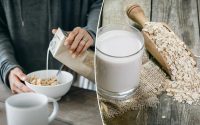Eating this many fruits and veggies as good as 4,000 steps a day: study
An apple a day keeps the doctor away — and a few more could keep the treadmill away, too.
Eating five pieces of fruits and vegetables every day can be as beneficial to your physical fitness as taking 4,000 steps, according to a new study published in the European Journal of Preventive Cardiology.
“This study provides some of the strongest and most rigorous data thus far to support the connection that better diets may lead to higher fitness,” said lead author Dr. Michael Mi of Harvard’s Beth Israel Deaconess Medical Centre. “The improvement in fitness we observed in participants with better diets was similar to the effect of taking 4,000 more steps each day.”
Harvard researchers measured the oxygen levels of 2,380 men and women — all of whom do the same amount of physical activity and said nutrition was a key factor in physical fitness — while they ran on a treadmill.
Volunteers completed a food frequency questionnaire looking at their consumption of 125 different food items over the past year, with options ranging from never or less than once per month to six or more servings per day.

Diet quality was then rated based on the Alternative Healthy Eating Index (AHEI) and the Mediterranean-style Diet Score (MDS) — both of which relate to heart health — taking into account age, sex, total daily energy intake, body mass index (BMI), smoking, cholesterol levels, blood pressure, diabetes and routine physical activity.
The higher the scores, the better quality the diet, with food consumption focusing on vegetables, fruits, whole grains, nuts, legumes, fish and healthy fats while limiting red meat and alcohol.
“In middle-aged adults, healthy dietary patterns were strongly and favorably associated with fitness even after taking habitual activity levels into account,” Mi said.

He added that the relationship between healthy diets and physical fitness was similar in women and men, yet more pronounced in people under the age of 54.
People who closely followed the Mediterranean diet had a fitness level equivalent to people from the researchers’ previous studies who took about 4,000 steps per day.
The Med diet — which was named the best diet overall for the sixth year in a row by US News & World Report — stresses the importance of quality sourcing and filling your plate with nutrient-rich whole foods and grains, with an emphasis on fresh produce, lean protein, such as fish and chicken, and, of course, antioxidant-rich olive oil.

Since fruits and vegetables are high in fiber, they act as a natural fat burner that helps metabolism.
The high levels of antioxidants in fruits and veggies also help prevent inflammation and other health issues.
The analysis also discovered 24 metabolites — a substance produced when the body breaks down food during digestion and releases it into the blood stream during exercise — that could be linked to either good or bad diet and fitness patterns.
“Our metabolite data suggest eating healthily is associated with better metabolic health, which could be one possible way that it leads to improved fitness and ability to exercise,” Mi said.

However, he noted that this was an observational study, so the researchers can’t conclude that eating a healthy diet causes better physical fitness, or eliminate the possibility of a reverse relationship, such as fit people choosing to eat well.
“There are already many compelling health reasons to consume a high-quality diet, and we provide yet another one with its association with fitness. A Mediterranean-style diet with fresh, whole foods and minimal processed foods, red meat and alcohol is a great place to start,” Mi said.
Recent research from a team at the University of Sydney suggested that women who follow the Mediterranean diet have a nearly 25% lower chance of heart disease and early death.
An earlier study from Harvard University said the Mediterranean diet was one of four common healthy eating patterns that can help reduce the risk of early death by up to 20%.


